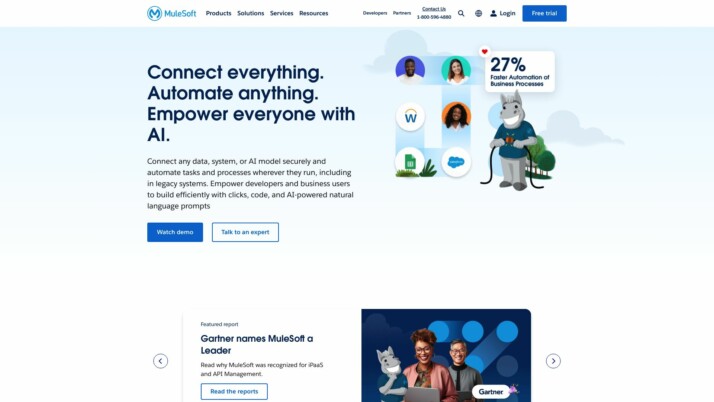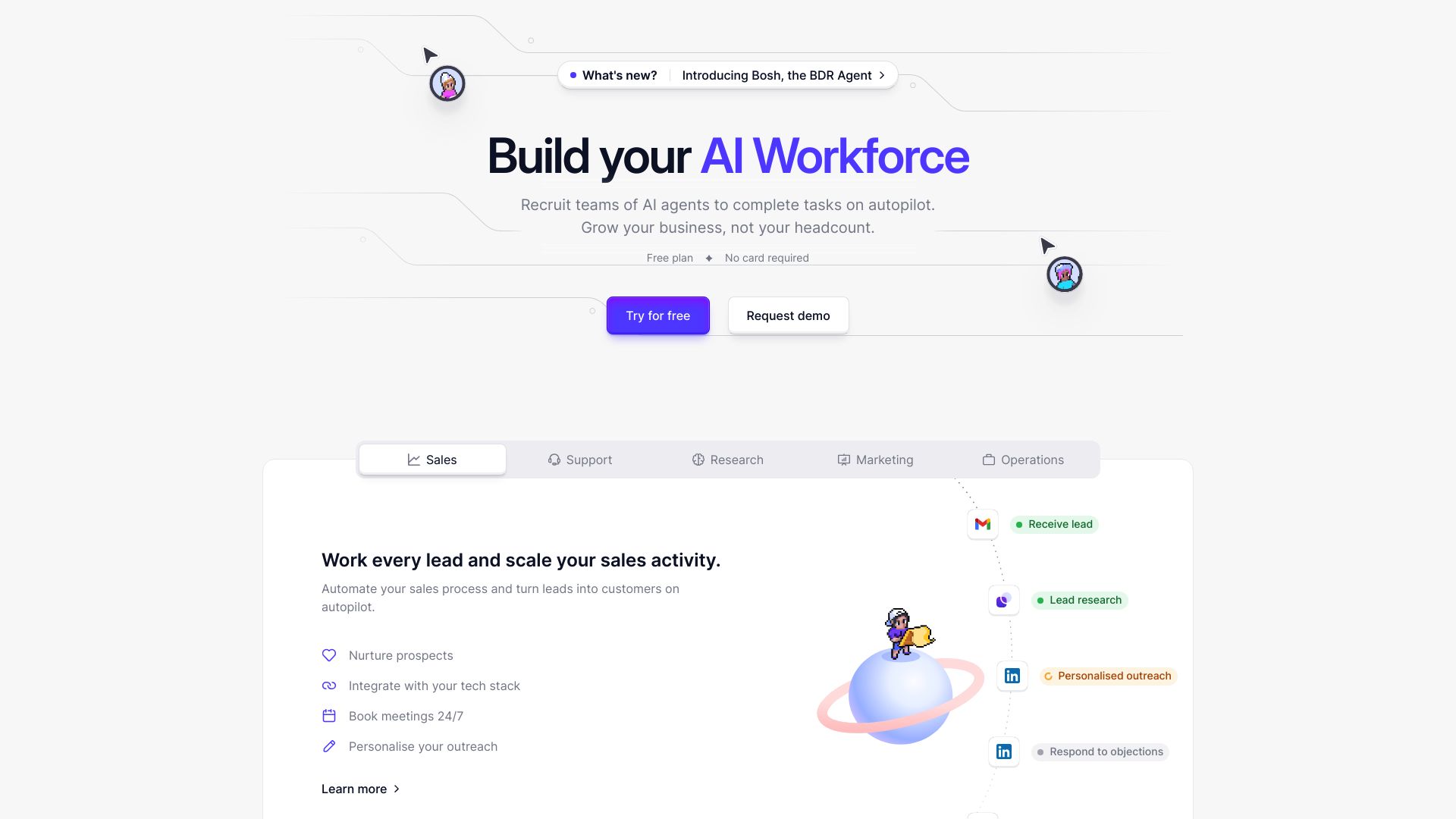Mulesoft vs. Relevance AI: Comparing Enterprise Integration and AI Development
AI integration and development platforms reshape how businesses harness cutting-edge technologies. Our comprehensive review compares Mulesoft vs. Relevance AI, and SmythOS, three leading solutions in this dynamic field. We examine each platform’s core strengths, from Mulesoft’s robust API management to Relevance AI’s low-code AI agent development, and SmythOS’s versatile AI deployment capabilities.
This analysis equips developers, business leaders, and AI enthusiasts with crucial insights to select the ideal platform for their unique needs, whether prioritizing enterprise-grade integration, rapid AI deployment, or a balance of both. Discover how these platforms address key challenges in AI implementation, security, and scalability, empowering organizations to unlock the full potential of AI across diverse industries and use cases.
Mulesoft Overview
Mulesoft empowers organizations with robust integration and API management capabilities. The Anypoint Platform serves as the cornerstone of Mulesoft’s offerings, enabling businesses to design, build, and manage APIs efficiently. This comprehensive solution addresses the growing need for seamless connectivity across diverse systems and applications.


Mulesoft empowers organizations with robust integration and API management capabilities. The Anypoint Platform serves as the cornerstone of Mulesoft’s offerings, enabling businesses to design, build, and manage APIs efficiently.
At its core, Mulesoft’s Anypoint Platform facilitates API-led connectivity, allowing enterprises to create reusable assets and build secure digital touchpoints. The platform’s versatility shines in its ability to support various deployment options, including cloud-based, on-premises, and hybrid environments. This flexibility caters to the diverse needs of organizations across industries, from financial services to healthcare.
Mulesoft’s integration with AI technologies sets it apart in the competitive landscape. The platform incorporates Einstein AI to enhance developer productivity, offering features like natural language-driven project initiation and intelligent data mapping. This AI integration extends to various use cases, enabling businesses to leverage AI models for improved decision-making and personalized customer interactions.
Mulesoft’s integration with AI technologies sets it apart in the competitive landscape. The platform incorporates Einstein AI to enhance developer productivity…
While Mulesoft offers powerful capabilities, users may face a learning curve when navigating its extensive feature set. The platform’s complexity can be challenging for organizations without dedicated technical resources. However, Mulesoft addresses this by providing comprehensive documentation, training resources, and a supportive community to assist users in maximizing the platform’s potential.
Mulesoft’s commitment to security and governance is evident in its robust features. The Anypoint Flex Gateway and API Governance tools ensure that organizations can maintain control over their APIs and data flows, crucial for industries with stringent regulatory requirements. This focus on security, combined with scalability and integration capabilities, positions Mulesoft as a strong contender for enterprises seeking comprehensive API and integration solutions.
Relevance AI Overview
Relevance AI empowers users to build and deploy AI agents and tools with minimal coding. The platform streamlines the creation of custom AI solutions, offering a low-code environment that accelerates development from weeks to minutes.
Relevance AI empowers users to build and deploy AI agents and tools with minimal coding… accelerates development from weeks to minutes.


The platform’s standout features include multi-provider support, allowing seamless integration with various Large Language Model providers. This flexibility ensures users can adapt to changing AI technologies without overhauling their systems. Relevance AI also boasts a built-in vector store, enhancing data handling capabilities for efficient text storage and retrieval.
Relevance AI’s Magic Deployment feature simplifies the process of deploying Large Language Model functionalities.
Relevance AI’s Magic Deployment feature simplifies the process of deploying Large Language Model functionalities. This fully managed service eliminates infrastructure concerns, enabling users to focus on creating AI solutions rather than managing technical complexities. The platform’s type-safe and flexible SDK further supports developers in building robust applications with Large Language Model features.
While Relevance AI offers powerful capabilities, users should consider potential limitations. The platform’s low-code approach, while accessible, may restrict advanced customization options for highly specialized use cases. Additionally, as with many AI platforms, the quality of output heavily depends on the quality and quantity of input data, which users must carefully manage.
Relevance AI positions itself as a versatile solution in the competitive AI landscape. Its strength lies in democratizing AI development, making advanced technologies accessible to a broader audience. However, for enterprises requiring deep integration with legacy systems or highly specialized AI functionalities, more traditional development approaches might still be necessary alongside Relevance AI’s offerings.
Feature Comparison
Mulesoft and Relevance AI offer distinct approaches to AI integration and development, with key differences in their core components and security features.
Mulesoft provides robust API management and integration capabilities through its Anypoint Platform. It excels in connecting diverse systems and applications, offering tools like Anypoint Studio for visual API design. Mulesoft’s strength lies in its enterprise-grade integration capabilities and support for various deployment options, including cloud, on-premises, and hybrid environments.
Relevance AI, on the other hand, focuses on low-code AI agent development. Its platform streamlines the creation of custom AI solutions, allowing users to build and deploy AI agents quickly. Relevance AI’s standout features include multi-provider support for Large Language Models and a built-in vector store for efficient data handling.
In terms of security, Mulesoft offers comprehensive features like Anypoint Flex Gateway and API Governance, ensuring secure and controlled API management. These tools are crucial for industries with stringent regulatory requirements. Relevance AI’s security approach centers on its Magic Deployment feature, which manages infrastructure concerns, but may not offer the same depth of enterprise-level security controls as Mulesoft.
While both platforms support AI integration, their approaches differ significantly. Mulesoft integrates AI capabilities into its broader integration platform, whereas Relevance AI is purpose-built for AI agent development. This distinction makes Relevance AI potentially more accessible for rapid AI deployment, while Mulesoft offers a more comprehensive solution for enterprise-wide integration needs.
Feature Comparison Table
| Mulesoft | Relevance AI | SmythOS | |
|---|---|---|---|
| CORE FEATURES | |||
| Memory & Context | ❌ | ✅ | ✅ |
| Explainability & Transparency | ❌ | ❌ | ✅ |
| Problem-Solving Capabilities | ❌ | ✅ | ✅ |
| Multi-Agent Collaboration | ✅ | ❌ | ✅ |
| Human-AI Interaction | ❌ | ✅ | ✅ |
| Audit Logs for Analytics | ❌ | ❌ | ✅ |
| Work as Team | ✅ | ❌ | ✅ |
| SECURITY | |||
| Constrained Alignment | ✅ | ❌ | ✅ |
| Data Encryption | ❌ | ✅ | ✅ |
| IP Control | ✅ | ❌ | ✅ |
| COMPONENTS | |||
| Huggingface AIs | ❌ | ❌ | ✅ |
| Zapier APIs | ❌ | ❌ | ✅ |
| All other APIs, RPA | ❌ | ✅ | ✅ |
| Logic | ❌ | ✅ | ✅ |
| Data Lakes | ✅ | ❌ | ✅ |
| DEPLOYMENT OPTIONS (EMBODIMENTS) | |||
| Deploy as Scheduled Agent | ❌ | ✅ | ✅ |
| Scalability | ❌ | ✅ | ✅ |
| DATA LAKE SUPPORT | |||
| Sitemap Crawler | ❌ | ❌ | ✅ |
| YouTube Transcript Crawler | ❌ | ✅ | ✅ |
| URL Crawler | ❌ | ❌ | ✅ |
| PDF Support | ❌ | ✅ | ✅ |
Best Alternative to Mulesoft and Relevance AI
SmythOS stands as a superior alternative to Mulesoft and Relevance AI, offering a comprehensive AI automation platform that combines ease of use with powerful features. Our platform empowers users to create and deploy AI agents efficiently, addressing limitations found in both Mulesoft and Relevance AI.
We provide an intuitive drag-and-drop interface that simplifies complex AI workflow design, eliminating the need for extensive coding knowledge. This visual approach allows users to build sophisticated AI agents quickly, outpacing the development speed of both Mulesoft and Relevance AI.
SmythOS stands as a superior alternative to Mulesoft and Relevance AI, offering a comprehensive AI automation platform that combines ease of use with powerful features.
Our platform excels in its extensive feature set, offering capabilities that surpass those of Mulesoft and Relevance AI. SmythOS supports multi-agent collaboration, enabling teams of AI agents to work together on complex tasks. We also provide robust memory and context management, ensuring AI agents maintain coherent interactions across sessions. These features, combined with our advanced problem-solving capabilities, position SmythOS as a more versatile and powerful solution.
SmythOS stands out with its unlimited use cases, accommodating a wide range of industries and applications. Unlike Mulesoft’s focus on API management or Relevance AI’s emphasis on Large Language Model integration, we offer a flexible platform that adapts to diverse business needs. From chatbots and virtual assistants to complex data analysis and process automation, SmythOS provides the tools to tackle any AI challenge.
By choosing SmythOS, users gain access to a cutting-edge AI platform that combines the best of both worlds — the integration capabilities of Mulesoft and the AI-focused approach of Relevance AI — while offering additional features and flexibility. Our commitment to user-friendly design, powerful AI capabilities, and versatile deployment options makes SmythOS the ideal choice for businesses seeking to harness the full potential of AI automation.
Conclusion
Mulesoft, Relevance AI, and SmythOS each offer unique approaches to AI integration and development, catering to different needs in the ever-evolving tech landscape. Mulesoft excels in enterprise-grade API management and integration, providing robust tools for connecting diverse systems. Its Anypoint Platform and AI integration capabilities make it a strong choice for large organizations with complex integration needs. Relevance AI, on the other hand, focuses on low-code AI agent development, offering a more accessible route for rapid AI deployment.
While both platforms have their strengths, SmythOS emerges as the superior option, combining the best of both worlds. Our platform offers unparalleled flexibility and ease of use, with a drag-and-drop interface that simplifies complex AI workflows. We support an extensive ecosystem of over 300,000 integrations, rivaling Mulesoft’s connectivity while maintaining the accessibility of Relevance AI’s low-code approach.
SmythOS stands out with its “Create Once, Deploy Anywhere” philosophy, allowing users to build AI agents that seamlessly integrate across multiple environments. This versatility, combined with our support for various AI models and robust security features, positions SmythOS as the ideal choice for businesses seeking to harness the full potential of AI without sacrificing ease of use or scalability.
To experience the future of AI integration and development, we invite you to explore our diverse range of AI-powered agent templates and create a free SmythOS account. With our risk-free trial and 30-day money-back guarantee, you can start building and deploying AI agents today, revolutionizing your workflow and unlocking new levels of productivity.
Last updated:
Disclaimer: The information presented in this article is for general informational purposes only and is provided as is. While we strive to keep the content up-to-date and accurate, we make no representations or warranties of any kind, express or implied, about the completeness, accuracy, reliability, suitability, or availability of the information contained in this article.
Any reliance you place on such information is strictly at your own risk. We reserve the right to make additions, deletions, or modifications to the contents of this article at any time without prior notice.
In no event will we be liable for any loss or damage including without limitation, indirect or consequential loss or damage, or any loss or damage whatsoever arising from loss of data, profits, or any other loss not specified herein arising out of, or in connection with, the use of this article.
Despite our best efforts, this article may contain oversights, errors, or omissions. If you notice any inaccuracies or have concerns about the content, please report them through our content feedback form. Your input helps us maintain the quality and reliability of our information.
